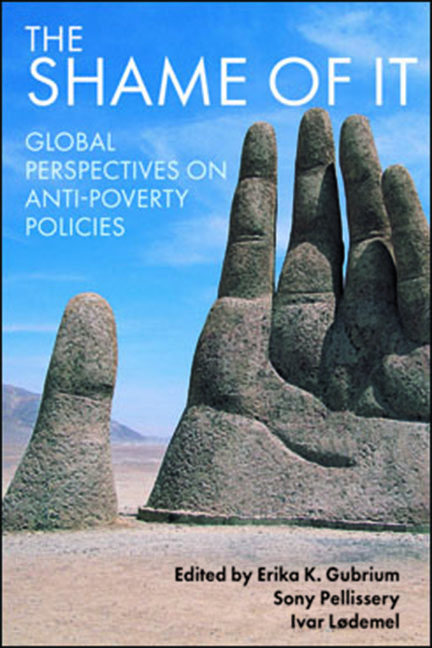Book contents
- Frontmatter
- Dedication
- Contents
- Notes on contributors
- Acknowledgements
- Preface
- one Resetting the stage
- two New urban poverty and new welfare provision: China’s dibao system
- three Thick poverty, thicker society and thin state: policy spaces for human dignity in India
- four Self-sufficiency, social assistance and the shaming of poverty in South Korea
- five ‘Not good enough’: social assistance and shaming in Norway
- six Pakistan: a journey of poverty-induced shame
- seven Separating the sheep from the goats: tackling poverty in Britain for over four centuries
- eight ‘Food that cannot be eaten’: the shame of Uganda’s anti-poverty policies
- nine Shame and shaming in policy processes
- ten Towards global principles for dignity-based anti-poverty policies
- Index
nine - Shame and shaming in policy processes
Published online by Cambridge University Press: 03 February 2022
- Frontmatter
- Dedication
- Contents
- Notes on contributors
- Acknowledgements
- Preface
- one Resetting the stage
- two New urban poverty and new welfare provision: China’s dibao system
- three Thick poverty, thicker society and thin state: policy spaces for human dignity in India
- four Self-sufficiency, social assistance and the shaming of poverty in South Korea
- five ‘Not good enough’: social assistance and shaming in Norway
- six Pakistan: a journey of poverty-induced shame
- seven Separating the sheep from the goats: tackling poverty in Britain for over four centuries
- eight ‘Food that cannot be eaten’: the shame of Uganda’s anti-poverty policies
- nine Shame and shaming in policy processes
- ten Towards global principles for dignity-based anti-poverty policies
- Index
Summary
In the first chapter of this volume, Erika Gubrium showed how novel concerns in the current global stage have inspired our research on the relationship between shame and anti-poverty policy. As the volume by Chase and Bantebya (2014) demonstrates, shame is closely linked to poverty regardless of the existence and nature of anti-poverty policies. And where such programmes are in place, an encounter with officialdom is only one of many arenas where a poor person is reminded of his or her inferior status. Still, as the preceding chapters have demonstrated, and as we summarise here, policies and programmes have the potential to either heighten or lessen the shame that people feel as a result of living in poverty. For example, shame can be heightened for an applicant at the point of the determination of eligibility for an anti-poverty measure, if only for having to admit to or demonstrate their poverty. If an applicant is treated without respect and dignity, this feeling is likely to be heightened further. In other situations, policies can lessen the feeling of shame, provided that applicants and recipients are met by officialdom in a respectful way and if, in fact, the benefits and services received alleviate poverty or offer new opportunities for self-reliance.
This chapter attempts to draw conclusions by comparing very diverse country contexts and different types of policy measures. It therefore faces the challenge of applying an appropriate methodology. But how does one compare heterogeneous social policies in hugely different national contexts? The broad design of this research has followed a maximum difference approach (explained in chapter 1) (see Walker, 2014) in order to explore the possibility of a universal connection between poverty and shame. However, the comparison of policies themselves is more elusive. When the impact of policy – with a particular focus on poverty-induced shame – is in question, it is difficult to disentangle causality attributed to policy rather than context. For instance, how does one compare the personal impact of education policy in Uganda with that of a human capital-based work activation programme in Norway?
The purpose of this chapter is not to compare these diverse contexts and policies in order to establish that one national setting or policy is more or less shaming than another.
- Type
- Chapter
- Information
- The Shame of ItGlobal Perspectives on Anti-Poverty Policies, pp. 179 - 198Publisher: Bristol University PressPrint publication year: 2013



